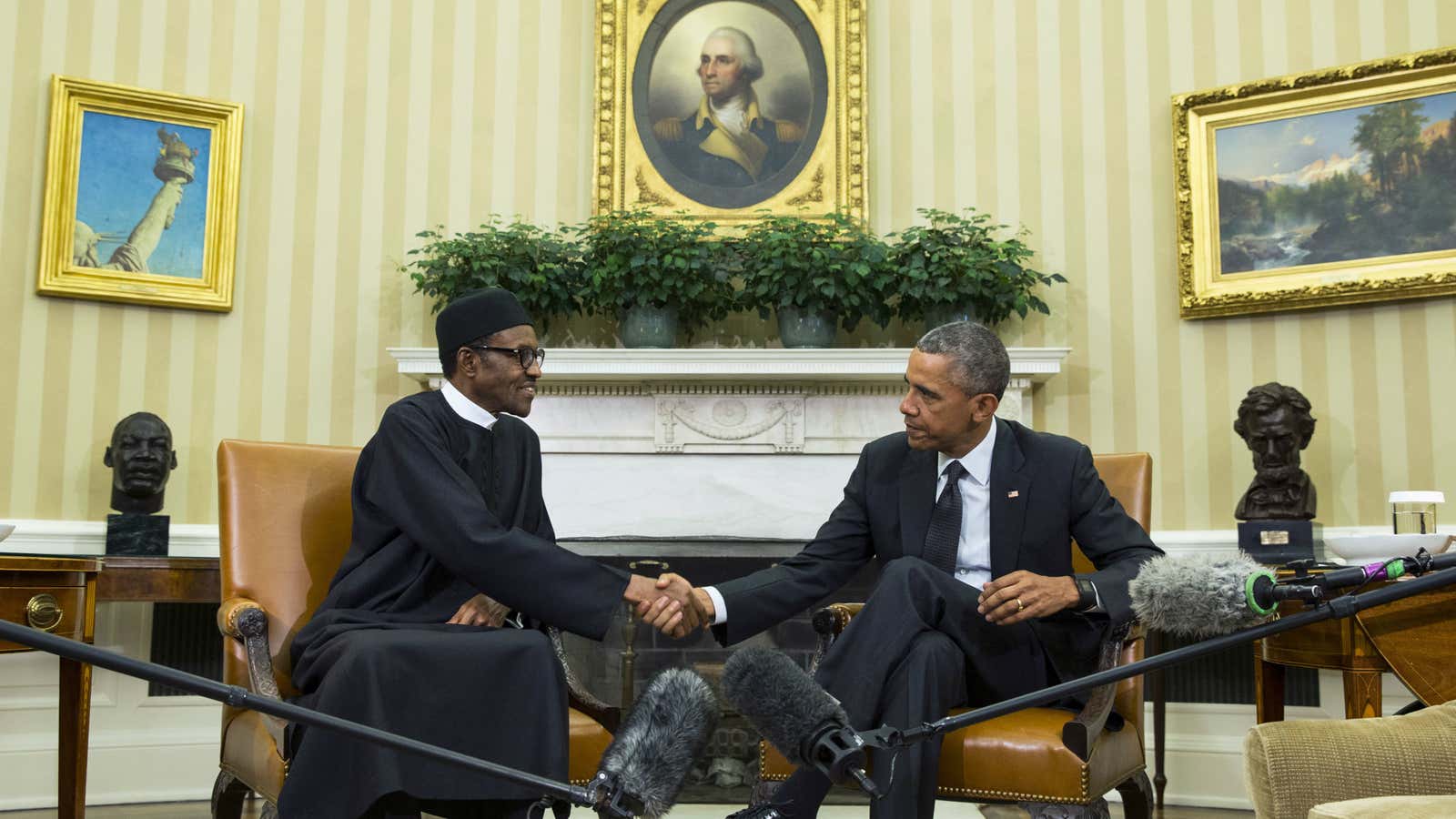Nigerians may have reason to feel that Barack Obama is giving them the cold shoulder. Though he hosted Nigeria’s president, Muhammadu Buhari, in Washington, DC, this week, the US president has never set foot in the country himself. On what looks like being his final official trip to Africa later this year, Obama will finally visit Kenya, the country of his father, as well as Ethiopia, but not Nigeria.
But I believe Obama has more in mind for Nigeria, and for Africa, than appearances may suggest.
The truth of that matter is that Nigeria has punched below its weight on the world stage recently. Plenty of soft power, yes—we have Nobel prize winners, champion scientists, footballers, actors, musicians, and Super Bowl winners. Heck we can even claim one of the best Canadian ice hockey players of recent vintage, Jarome Iginla, as one of our own. But the days when Nigeria stood up to the apartheid government in South Africa and dominated peacekeeping missions on the continent are no longer.
I served as an aide to three administrations, leaving the Presidential Villa in May, after president Goodluck Jonathan was voted out of office. In a sense I was in the wrong place at the right time. I was able to witness the rising incidence of crude oil theft, piracy, corruption, human trafficking, small arms, illegal immigrants and Boko Haram—things that prompted The Economist to declare that Nigeria as ‘Africa’s most important failure’. Anyone with an objective mind can see that Nigeria was fast becoming an outlaw, even unto ourselves.
And yet Obama and US policy-makers do recognise that while we have our challenges, Nigeria also presents a tremendous opportunity. The “Africa rising” narrative is already a sell in Washington, and Nigeria is a key part of it. We are the biggest market in Africa. Our youthful, entrepreneurial population, doubling every 25 years, is predicted to overtake that of the US by the middle of this century, making us a country with the potential to stand eyeball to eyeball with anyone in the future.
But first we have to fix our domestic challenges. In pushing for free and fair elections in Nigeria, Obama played a part in ushering the change that Nigerians voted for in March this year. In Washington this week, Buhari and Obama sought to add substance to the symbolism of change, exchanging notes and strategy on corruption and regional security.
‘President of Africa’
Though Obama has made fewer trips to Africa than either of his immediate predecessors, George W. Bush and Bill Clinton, he has always understood the power and impact of Nigeria. I first met him on Capitol Hill in the summer of 2005, when he was a senator, and we talked extensively. I was surprised he knew so much about my country. And as Buhari departs Washington, Obama’s Africa critics should note that Obama has a long-term strategic intent with regards to the continent.
If you follow these things carefully enough you will have noticed how Obama has stealthily laid claim to the Mandela mantle. Apart from his relatively frequent visits to South Africa and his presence at Madiba’s funeral, he has championed future African leaders through The Mandela Washington fellowship for Young African Leaders, a flagship program of Obama’s Young African Leaders Initiative (YALI).
“I have no doubt,” Obama said at a town hall with the fellows in July last year, “that you’re going to leave behind for the next generation and the generation after that an Africa that is strong and vibrant and prosperous, and is ascendant on the world stage.”
The septuagenarian Buhari may not have been the future leader that Obama had in mind when he conceived of the programme. But as he attested this week, he firmly believes that Buhari has the credentials and the personal will to tackle the corruption and insecurity that is the form and function of Nigeria’s decline. So while Obama may not get to Nigeria as president, he has backed the kind of leadership in Abuja that he can do business with after he leaves office next year.
During his last trip to Africa in 2013, Obama spelled out his vision at a joint press conference with president Macky Sall of Senegal: “We will encourage American companies to seize trade and investment opportunities in Africa, so that their skills, capital, and technology will further support the region’s economic expansion, while helping to create jobs here in America”.
That is Obama’s personal mission in Africa. I suspect that once he leaves the White House, he will be freer to engage with the land of his father—only this time maybe as some kind of president of the United States of Africa, using his connections to drive a progressive and commercial engagement with the continent. It is a role for which he is uniquely qualified.
